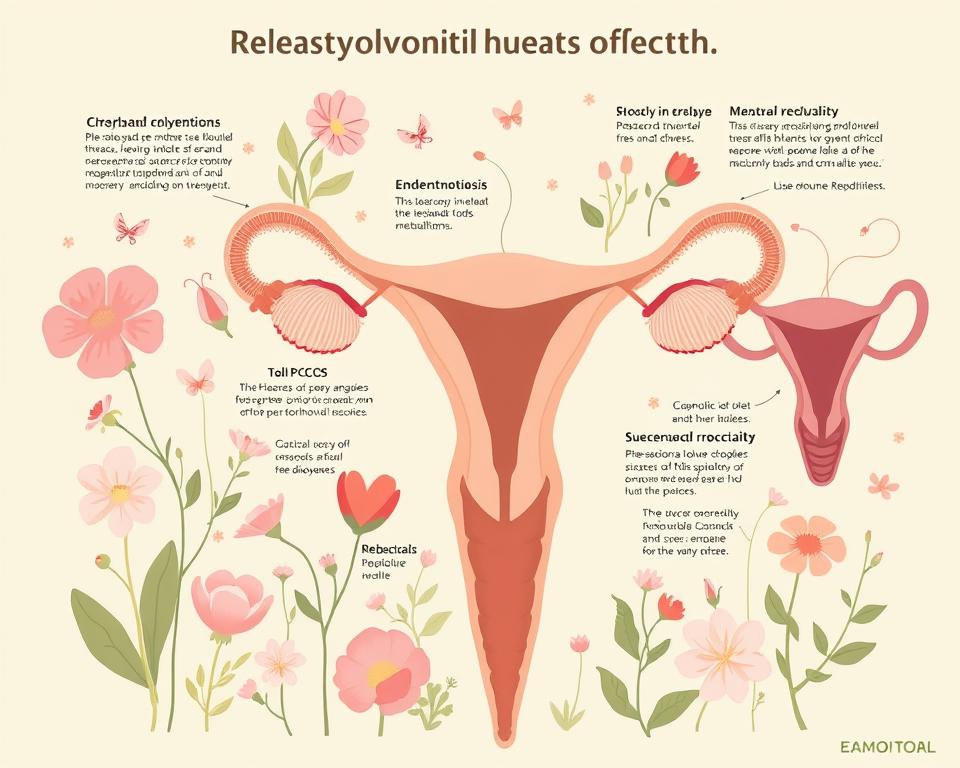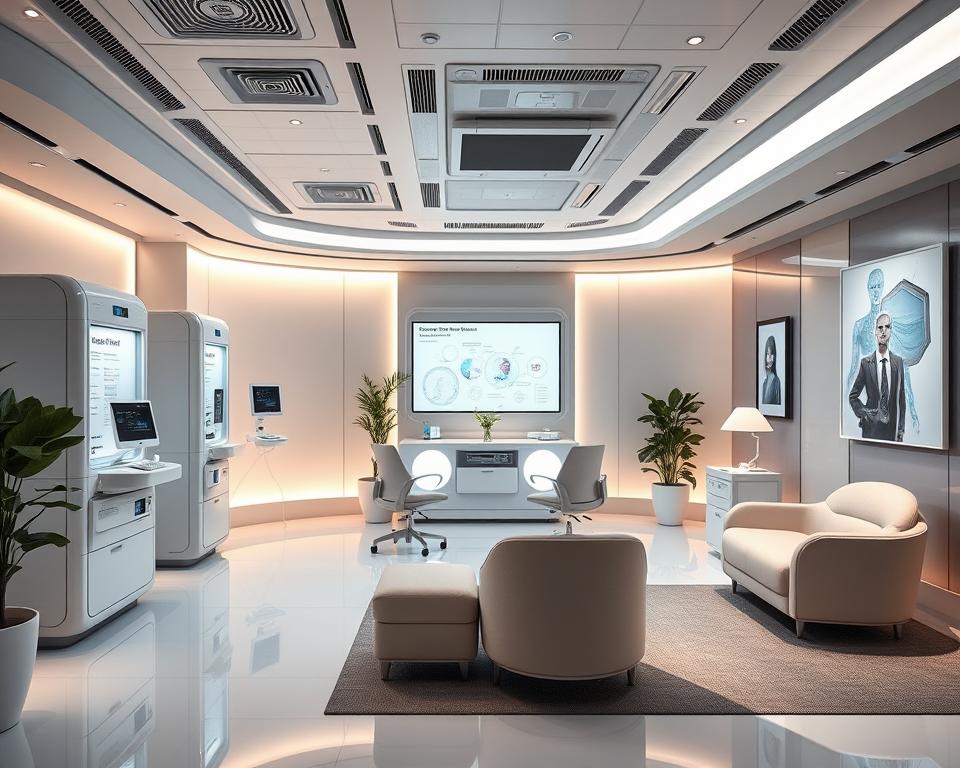Understanding reproductive health is key for millions of Americans affected by disorders each year. This guide will help you understand various reproductive health issues and treatments in the USA. It’s important to know about these to make good choices for your health.
Learning about reproductive health helps solve problems and find treatments. You’ll discover new developments in fertility and reproductive health services. The USA has made big strides, with over 150 House members pushing for reproductive rights. A reproductive health guide is a must-have for anyone wanting to know more about these issues.
Key Takeaways
- Reproductive health is a critical aspect of overall well-being, and it’s essential to have a comprehensive reproductive health guide.
- Reproductive disorders affect millions of Americans each year, making it crucial to address reproductive health issues.
- The USA has made significant progress in reproductive health, with advances in fertility treatments and reproductive health services.
- A reproductive health guide can provide you with the necessary information to make informed decisions about your reproductive health.
- It’s vital to stay up-to-date with the latest developments in reproductive health, including advances in fertility treatments and reproductive health services.
- Reproductive health problems and treatments in the USA are complex and multifaceted, requiring a comprehensive approach to address them effectively.
- A reproductive health guide can help you navigate the complex world of reproductive health, providing you with the necessary tools and resources to maintain optimal reproductive health.
Understanding Best Reproductive Health, Problems & Treatment 2025 in USA
The USA’s reproductive healthcare is facing big challenges. Millions of Americans deal with reproductive health issues every year. To get the best reproductive health by 2025, we must tackle these problems and keep up with new treatments.
The current healthcare situation is complex. Many factors, like access and cost, play a big role in these issues.
Key problems in American reproductive health include limited abortion access and birth control options. There’s also a worry about future IVF restrictions. While treatments have improved, we need more progress to meet today’s healthcare needs.
To beat these challenges, staying updated on reproductive health is key. Supporting policies that help access quality care is also important. Knowing about reproductive health challenges helps people make better choices for their health.
Common Female Reproductive Health Concerns
Women’s reproductive health is key to their overall well-being. Issues like endometriosis, PCOS, and uterine fibroids are common. If the Affordable Care Act changes, getting emergency contraception like Ella might get harder. It’s vital to stay updated on health trends and fight for access to care.
Some common female reproductive health concerns include:
- Menstrual problems, such as heavy or irregular bleeding
- Infertility or reduced fertility
- Pregnancy-related complications
- Uterine fibroids
- Polycystic ovary syndrome (PCOS)
Knowing the symptoms and causes of these issues is crucial. The Affordable Care Act covers many women’s health services without cost. These services include mammograms, cervical cancer screenings, and prenatal care.

It’s important to understand female reproductive health concerns. By staying informed and seeking medical help when needed, women can manage their health. This way, they can take care of their reproductive health and overall well-being.
| Condition | Symptoms | Treatment Options |
|---|---|---|
| Endometriosis | Pelvic pain, heavy bleeding | Hormonal therapies, surgery |
| Polycystic Ovary Syndrome (PCOS) | Irregular periods, weight gain | Hormonal therapies, lifestyle changes |
| Uterine Fibroids | Heavy bleeding, pelvic pressure | Hormonal therapies, surgery |
Essential Male Reproductive Health Issues
Male reproductive health is a big concern in the U.S. Many factors, like lifestyle, genetics, and environment, can affect it. It’s important for men to take care of their reproductive health to stay well.
Men often face issues like low sperm count and problems with sperm movement. Other problems, like erectile dysfunction and prostate health, also matter. Regular health checks help find and treat these issues early.
Dealing with male reproductive health needs a full plan. This includes changing lifestyle habits, medical treatments, and using advanced reproductive technologies. By focusing on preventive care, men can lower their risk of fertility problems and keep their reproductive system healthy.
| Male Reproductive Health Issue | Description |
|---|---|
| Low Sperm Count | A condition where the sperm count is lower than normal, affecting fertility |
| Erectile Dysfunction | A condition where the individual experiences difficulty achieving or maintaining an erection |
| Prostate Health | Prostate-related issues, such as prostate cancer, can impact male reproductive health |
Advanced Fertility Treatment Options
When looking into advanced fertility treatments, you’ll find many fertility treatment options. These include innovative fertility therapies and cutting-edge reproductive technology. They aim to help you start a family. The Johns Hopkins Fertility Center offers treatments like in vitro fertilization (IVF) and preimplantation genetic testing.
The Mayo Clinic and the UHealth Center for Reproductive Medicine also provide advanced treatments. They include IVF, fertility preservation, and treatments for issues like uterine fibroids and endometriosis.
Some key advanced fertility treatments are:
- In vitro fertilization (IVF)
- Preimplantation genetic testing
- Fertility preservation
- Intracytoplasmic sperm injection (ICSI)
These treatments help with different fertility problems. It’s crucial to talk to a specialist to find the right treatment for you.

Exploring these advanced fertility treatments and innovative fertility therapies can boost your chances of success. Always consult with a trusted fertility center. Discuss your options with a specialist to find the best treatment for you.
Breakthrough Reproductive Technologies
Recent advancements in reproductive medicine have led to the development of breakthrough reproductive technologies. These include AI in fertility treatment and genetic testing for fertility. These new technologies are changing the field of reproductive health. They offer hope to individuals and couples struggling with infertility.
Artificial intelligence is being used in fertility treatment to improve diagnosis accuracy and treatment personalization. Genetic testing for fertility is also becoming key. It helps identify genetic causes of infertility and boosts the success of assisted reproductive technologies.
New treatment protocols, like novel ovarian stimulation techniques and new male factor infertility approaches, are being developed. These advancements are expected to greatly improve fertility treatment outcomes. This means more individuals and couples can achieve their reproductive goals.
| Technology | Description |
|---|---|
| AI in Fertility Treatment | Improves diagnosis accuracy and treatment personalization |
| Genetic Testing for Fertility | Helps identify potential genetic causes of infertility |
| Emerging Treatment Protocols | Includes novel ovarian stimulation techniques and new approaches to male factor infertility |
As research continues to advance, we can expect to see even more breakthrough reproductive technologies emerge. These will offer new possibilities for individuals and couples seeking to build their families.
Navigating Reproductive Healthcare Services
Finding the right reproductive health care providers is key. They should offer a wide range of services, like preventive care and counseling. In the US, clinics provide everything from birth control to education on reproductive health.
These services are vital for many, especially young people, those with disabilities, and LGBTQ2S+ individuals. They help support health and wellbeing across different backgrounds.
Reproductive healthcare should meet the needs of all, including those with disabilities. It’s about giving people the freedom to choose their reproductive path. Providers should use inclusive language, like “people” and “pregnant people,” to respect everyone’s journey.
When looking for reproductive healthcare, consider a few things:
- Access to comprehensive care, including preventive services and treatment options
- Qualifications and expertise of reproductive health care providers
- Insurance coverage and costs associated with reproductive health services
- Availability of telemedicine options for reproductive health

Understanding these points helps make informed choices about reproductive health. Reproductive health clinics in the US are crucial for accessible care. It’s important to support and advocate for these services for the wellbeing of all.
Preventive Care and Wellness Strategies
Keeping your reproductive health in check starts with a healthy lifestyle. Eating well is key, with a diet full of fruits, veggies, and whole grains. Regular exercise, managing stress, and staying away from harmful substances are also important. These habits can greatly lower the risk of reproductive problems.
Preventive reproductive care is another crucial part of staying healthy. Regular check-ups and screenings are often free with health insurance. A balanced diet is also essential for overall wellness and reproductive health.
Some important parts of preventive care include:
- Regular health check-ups and screenings
- Healthy nutrition and lifestyle choices
- Stress management and mental health support
- Avoiding harmful substances and behaviors
By following these strategies, you can take charge of your reproductive health. This can help prevent health issues and improve your life quality.

| Service | Coverage |
|---|---|
| Preventive care services | Covered at no out-of-pocket cost |
| Routine health screenings | Covered by most health insurance plans |
By focusing on preventive care and healthy living, you can keep your reproductive health in top shape. Stay updated on the latest in reproductive health research, like President Biden’s proposals for women’s health.
Insurance Coverage and Treatment Costs
Understanding what health insurance covers is key for reproductive health. Recent data shows 36% of big employers plan to offer special plans in 2025. These plans aim to guide employees to affordable, quality care. This is important for fertility treatments, as some plans now cover more, like IVF, which is now covered by 45% of large employers.
Dealing with the costs of fertility treatments can be tough. But, some employers are stepping up with pre-conception planning benefits. By 2025, 35% of large employers will offer these benefits. Also, financial help is available for those on Medicare. Knowing these options can help you make better choices about your reproductive health.
Here’s a look at the costs and coverage for reproductive health services:
| Service | Coverage | Cost |
|---|---|---|
| IVF | 45% of large employers | Varies by plan |
| Pre-conception planning | 35% of large employers | Often covered as part of reproductive health insurance coverage |
| Fertility preservation | Covered by most health insurance carriers | Medically necessary services are typically covered |
It’s important to know that health carriers must cover infertility diagnosis and treatment. By understanding your insurance options and costs, you can make smart choices about your reproductive health.
Choosing the Right Reproductive Health Specialist
Finding the right specialist for reproductive health is key. Specialists like those at the Center for Reproductive Health & Gynecology (CRHG) offer many fertility treatments. These include IVF, egg freezing, and surrogacy. Look for a doctor with the right qualifications, like board certifications and specialized training.
A good reproductive health specialist has experience with many health issues. For example, Melissa Goodman has 20 years of experience in reproductive justice and LGBTQ rights. Ask your provider about their treatment approach, success rates, and experience with cases like yours.
Here are some important qualifications to look for in a reproductive health provider:
- Board certification in obstetrics and gynecology or reproductive endocrinology
- Specialized training in fertility treatments, such as IVF or egg freezing
- Experience in treating reproductive health issues, such as infertility or menstrual disorders
By considering these factors and doing your research, you can find a qualified reproductive health specialist. They will meet your needs and provide the best care.
Telemedicine and Virtual Care Options
Reproductive health telemedicine is becoming more popular. It offers a convenient way to get virtual fertility care and online reproductive health services. Now, patients can talk to healthcare providers from home, cutting down on in-person visits. This is especially good for those in rural areas, where healthcare access is often hard.
Telemedicine has many benefits, like making healthcare more accessible and saving money. It also helps with the shortage of healthcare providers, especially in rural areas. But, it’s important to remember that telemedicine is not a full replacement for in-person care. It’s meant to add to the healthcare experience.
As telehealth grows, making sure patients get good virtual care is key. This means using strong telehealth platforms, training healthcare providers, and spreading the word about virtual care’s benefits and limits. By doing this, we can make reproductive health telemedicine better and help more people across the country.
In conclusion, reproductive health telemedicine and virtual fertility care are changing how we get reproductive health services. With its many benefits and growing use, it’s vital to keep improving virtual care. This way, everyone can get quality healthcare, no matter where they are or what they’re going through.
Alternative and Complementary Treatments
When looking into reproductive health, you might think about alternative treatments and fertility therapies. These methods focus on the whole person, including mind, body, and spirit. Many people have found natural remedies helpful, alongside traditional treatments.
Examples include acupuncture, meditation, and yoga. These can lower stress and improve overall health, which is key for reproductive health. Studies show 29% of couples trying fertility care in the USA have used alternative medicine. This includes 22% trying acupuncture and 17% using herbal therapy.
Integrative medicine combines traditional and alternative therapies. It offers a full treatment plan, covering physical, emotional, and spiritual health. The American Society for Reproductive Medicine (ASRM) supports these treatments, even offering discounts for those in low-income countries.
It’s important to talk to a healthcare provider before starting alternative treatments. They can help you find the right mix of treatments for your needs. This way, you can create a plan that supports your reproductive health and well-being.
- Reduced stress and anxiety
- Improved overall well-being
- Increased sense of control and empowerment
- Potential improvement in reproductive health outcomes
Approach these treatments with an open mind and critical thinking. Always consult with healthcare providers and look at the research.
Future Trends in Reproductive Healthcare
Looking ahead, reproductive healthcare is set to change a lot. Future reproductive health trends show a big push for personalized medicine and better diagnostics. This means treatments will get more precise and health outcomes will improve.
New fertility treatments will use advanced tech like gene editing and stem cell therapies. These innovations aim to tackle infertility and other reproductive issues.
The future of reproductive medicine will also consider societal and ethical views. Research on artificial wombs and tackling health disparities is ongoing. Studies reveal over 40% of workers want better reproductive healthcare support from employers and insurers.
Moreover, research indicates that closing the health gap between men and women could add $1 trillion to the global economy by 2040.
Some key areas to watch in the future of reproductive healthcare include:
- Increased access to preventive care and screenings
- Advances in fertility preservation and treatment options
- Growing awareness of reproductive health disparities and efforts to address them
As reproductive healthcare evolves, staying updated is crucial. By keeping up with future reproductive health trends and upcoming fertility treatments, people can make better choices for their health. This helps shape the future of reproductive medicine.
Conclusion
Looking ahead to 2025, reproductive health care in the USA is set for big changes. Some states have put limits on abortion, but new treatments and tech offer hope. Telemedicine and AI are making care more personal, accessible, and effective.
By keeping up with new info and talking to healthcare pros, you can feel confident about your reproductive health. The medical field is always exploring new possibilities. You can make choices that fit your needs and values. Together, we can make reproductive health celebrated, empowered, and available to everyone.
Your reproductive health is key to your overall well-being. By focusing on proactive care, using new tech, and fighting for your rights, you and your loved ones will get the support you need. The road ahead might be tough, but with the right info and resources, you can handle reproductive health challenges and do well in the future.
FAQ
What is the current state of reproductive healthcare in the USA?
Reproductive healthcare in the USA has seen progress and challenges. The guide covers these advancements and issues. It talks about access to care and how to make it more affordable.
What are the most common reproductive health issues affecting women in the USA?
Women in the USA face many reproductive health issues. These include endometriosis, PCOS, uterine fibroids, and infertility. Menstrual disorders and pregnancy complications are also common.
What are the main reproductive health concerns for men in the USA?
Men in the USA deal with fertility issues like low sperm count. They also face erectile dysfunction and prostate health problems. Preventive care and treatments are key.
What are the latest advancements in fertility treatments in the USA?
The USA offers advanced fertility treatments like IVF and ICSI. Preimplantation genetic testing is also available. New therapies like stem cell treatments and gene editing are emerging.
How is technology transforming reproductive healthcare in the USA?
Technology is changing reproductive medicine in the USA. Artificial intelligence and genetic testing are being used. These advancements improve diagnosis and treatment.
How can individuals access and utilize reproductive healthcare services in the USA?
Finding qualified reproductive health providers is crucial. Understanding different clinics and insurance coverage is important. Telemedicine options are also available for reproductive health services.
What can individuals do to maintain and improve their reproductive health?
To improve reproductive health, individuals should make lifestyle changes. Eating right and regular check-ups are important. These steps help maintain reproductive health.
How does insurance coverage and treatment costs impact reproductive healthcare in the USA?
Insurance coverage affects reproductive health services in the USA. Knowing what’s covered and the costs is essential. Financial assistance programs and financing options are available.
What should individuals consider when choosing a reproductive health specialist?
Choosing a reproductive health specialist requires careful consideration. Look for qualifications and ask important questions. Be aware of red flags.
How is telemedicine shaping the future of reproductive healthcare in the USA?
Telemedicine is changing reproductive healthcare in the USA. It offers remote services and benefits. New technologies enable remote monitoring of fertility and reproductive health.
What are some alternative and complementary approaches to reproductive healthcare in the USA?
Alternative and complementary approaches include acupuncture and meditation. Integrative medicine and natural remedies support reproductive health. These methods are gaining popularity.
What are some of the emerging trends and future advancements in reproductive healthcare in the USA?
The future of reproductive healthcare looks promising. Research focuses on stem cell therapies and gene editing. Personalized medicine and advanced diagnostics will improve health outcomes.
Source Links
- Reproductive Health – https://www.niehs.nih.gov/health/topics/conditions/repro-health
- Reproductive Healthcare – https://scottpeters.house.gov/reproductive-healthcare
- American Society for Reproductive Medicine (ASRM) – https://www.asrm.org/
- Project 2025 | Reproductive Freedom for All – https://reproductivefreedomforall.org/resources/project-2025/
- How Project 2025 Seeks to Obliterate Sexual and Reproductive Health and Rights – https://www.guttmacher.org/fact-sheet/how-project-2025-seeks-obliterate-srhr
- 3 Major Ways Project 2025 Could Impact Your Reproductive Health – https://www.self.com/story/project-2025-reproductive-health-care
Stay with yugalglobal.com to get more content.


